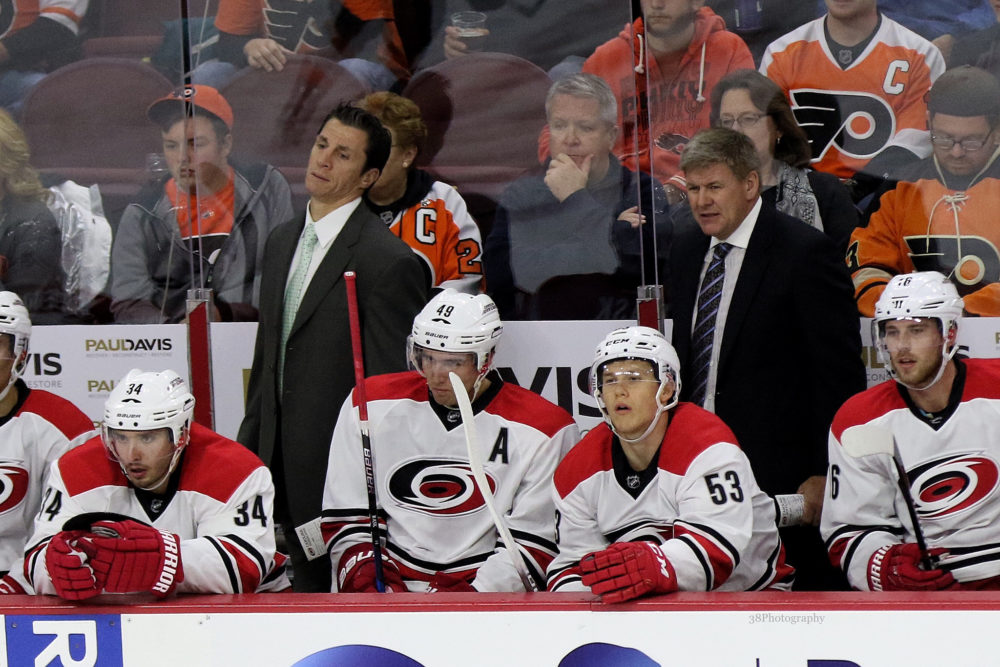Two days after squandering a 2-1 second-intermission lead to lose in regulation, you would think that the Carolina Hurricanes would enter Thursday’s third period intent on protecting another one goal lead.
It didn’t look that way.
The Hurricanes were instead out-attempted 34-10 and out-shot 12-9 by the Boston Bruins in the third period, riding Cam Ward’s heroics all the way until a fluky but inevitable rebound bounced off Teuvo Teravainen’s skate and in the goal with 31 seconds left. The Bruins went on to win in the shootout.
Thursday’s meltdown in Massachusetts continued a trend that has hampered the Hurricanes all season and particularly in recent weeks: lethargic third periods bent on treacherously protecting slim leads, often with catastrophic results.
By the Numbers
The Hurricanes have scored just 14 third period goals this season, the lowest in the league after the Coyotes potted their 15th on Thursday.
Their goal differential by period now expands to minus-one in the first (15 to 16), plus-five in the second (25 to 20), minus-six in the third (14 to 20) and minus-three in overtime (0 to 3).
The failures of the raw scoreboard totals to tell the story of the Hurricanes’ play has been well-documented for years — the team historically performs better than the goals column and the win-loss column demonstrates. In this case, though, that’s not exactly the case.

Period-by-period shot attempt data isn’t available online, but compiling the data over the team’s last nine games — dating back to Nov. 12 against the Washington Capitals — paints a bleak picture. The Hurricanes have been largely an even possession team over that stretch, but they’ve accomplished that primarily through the first 40 minutes each night. In terms of shot attempts (Corsi), the Hurricanes have taken 53.7-percent of attempts in first and second periods combined but just 47.3-percent of attempts in third periods.
The worst example was Thursday in Boston: Carolina was plus-four through two (37 to 33) before being thrashed to the tune of minus-24 in the third (and an additional minus-10 in overtime, mostly due to Boston’s power play).
But Tuesday’s loss to the New York Rangers was also ugly (plus-20 in the first and second, minus-seven in the third) as was the win in Toronto (plus-nine through two, minus-eight in the third).
Certainly, the effect of the score — a losing team generally acts more aggressively and thus produces more offensive chances — must be considered in this sample, but it doesn’t justify the Hurricanes’ ineptitude.
Canes now 6-1-4 when leading after two periods (were already league worst before tonight). 3-4-3 when scoring first. 1-of-6 in OT/shootout.
— Jamie Kellner 📸 (@jbkellner) December 2, 2016
Thursday’s Manifestation
Sitting back in, what FIFA video games would classify as, “park the bus” mode cost the Hurricanes two heartbreakers in their first two games of the season, blowing consecutive three-goal advantages in Winnipeg and Vancouver.
They seemed to learn a lesson from those meltdowns, at least to some extent, over the next weeks. The closing stretch in the Winnipeg rematch on Nov. 20 was actually one of the best lead-protecting third periods the team has had, stifling the Jets by allowing only 18 shot attempts and sealing the victory with a late goal of their own.
On Tuesday and particularly Thursday this week, however, they regressed.
The Bruins peppered Ward with shot after shot as the clock wound into single digits, attempting 25 shots in the final 10 minutes after attempting just 42 through the first 50 minutes. That a home team trailing by one would seek to throw everything towards the goal in that situation isn’t surprising, but the Hurricanes’ impotency to do anything other than blocking those shots was painful.
Bill Peters was forced to call his timeout to rest tired defenders and draw up a defensive zone plan with three minutes still on the clock — that’s something usually done in the final minute. Ron Hainsey proceeded to ice the puck again off that draw, all part of a dreadful night for the eldest defenseman. He failed to clear the zone with possession at several crucial times and was on the ice for a whopping 38 shot attempts against (compared to 16 for).
Even if Torey Krug’s tying goal two and a half minutes later was lucky, a goal of some sort was bound to happen.
Missed Points
With a 6-11 record in one-goal games (excluding empty netters) so far this season, the reason for the Hurricanes’ four-point deficit on a wild card spot is obvious. There’s a lot of the season left to play and the team has historically improved from autumn to winter each year. But the Hurricanes historically have also struggled to win tight games, and their overly conservative play in third periods this season doesn’t point toward a changing trend.